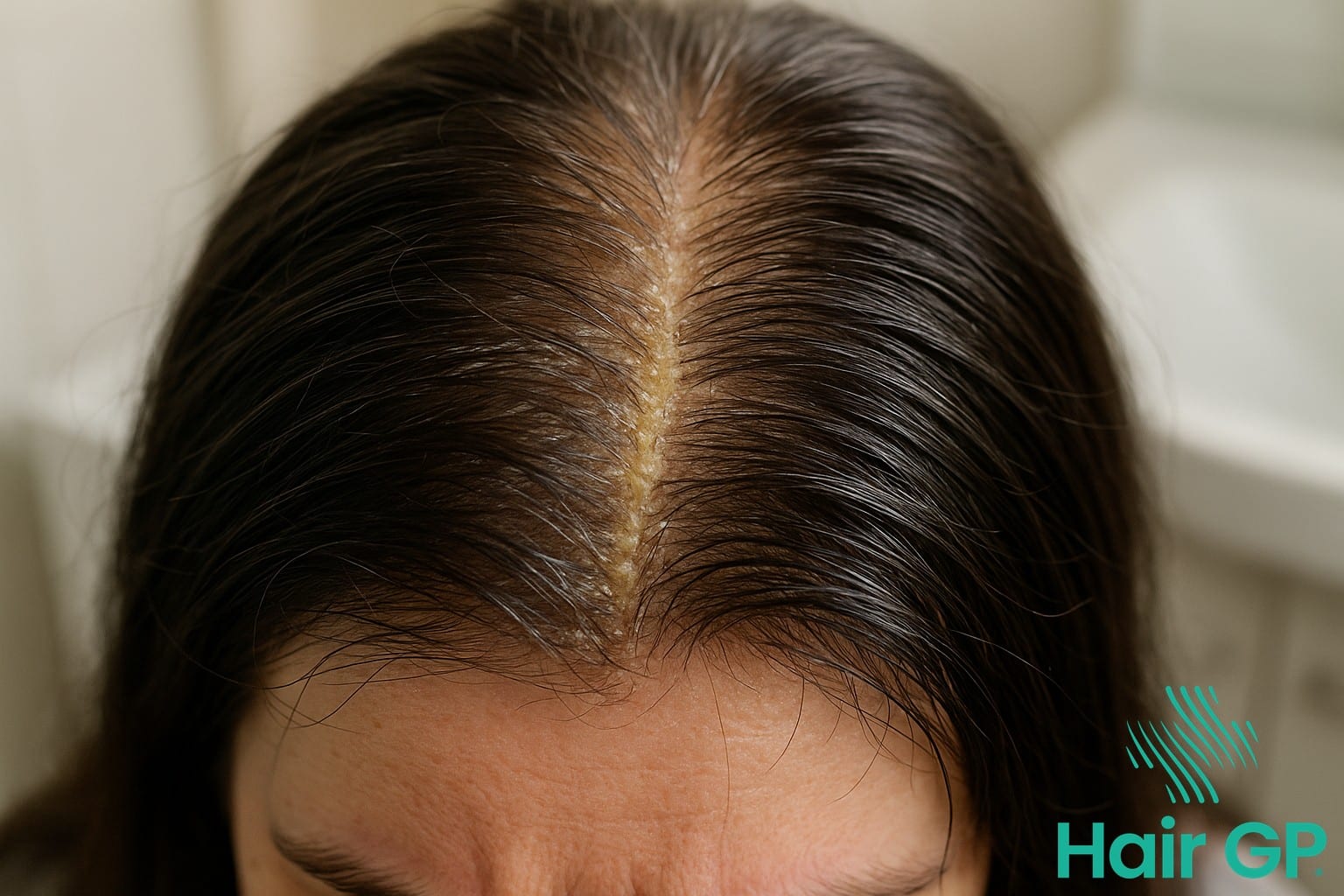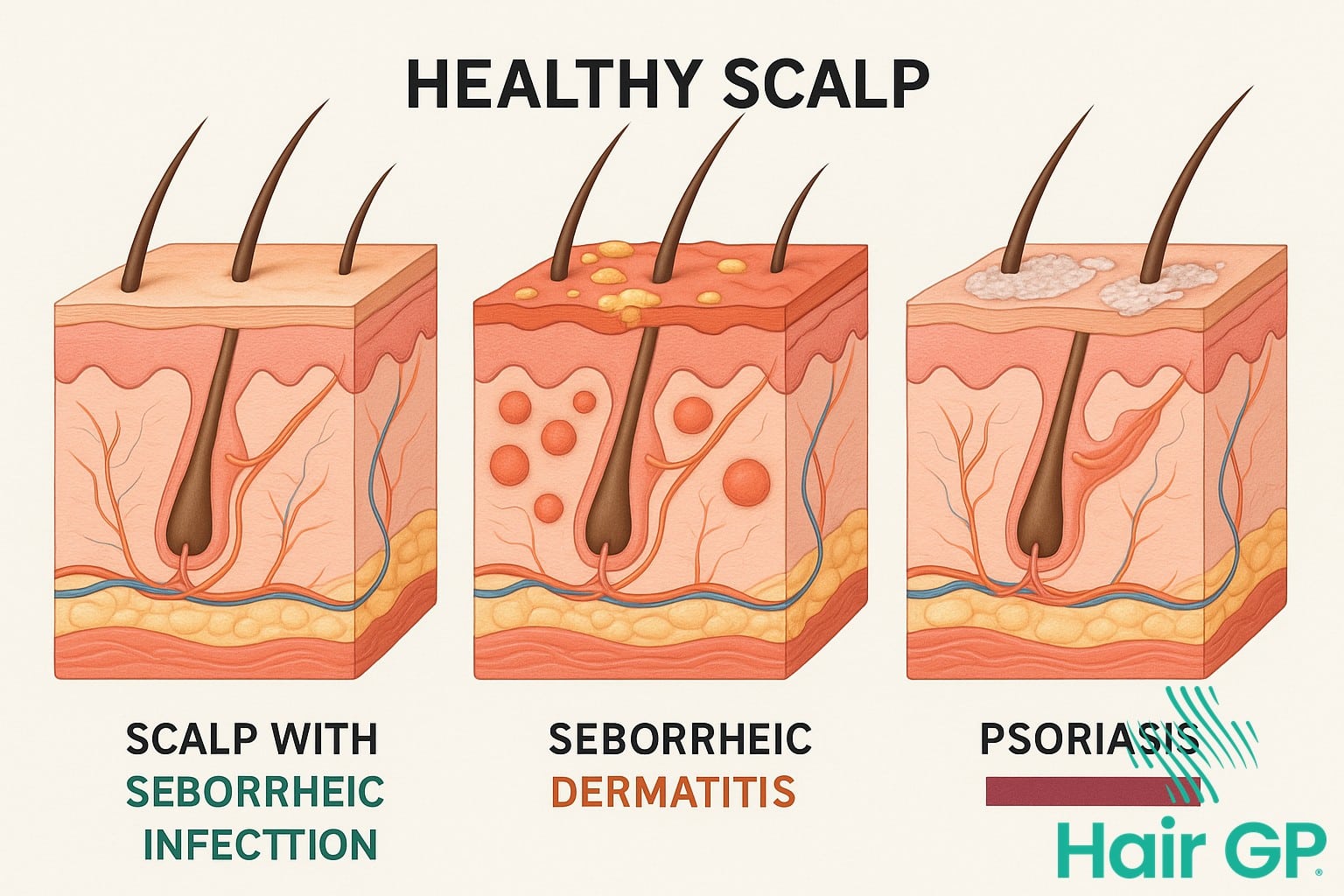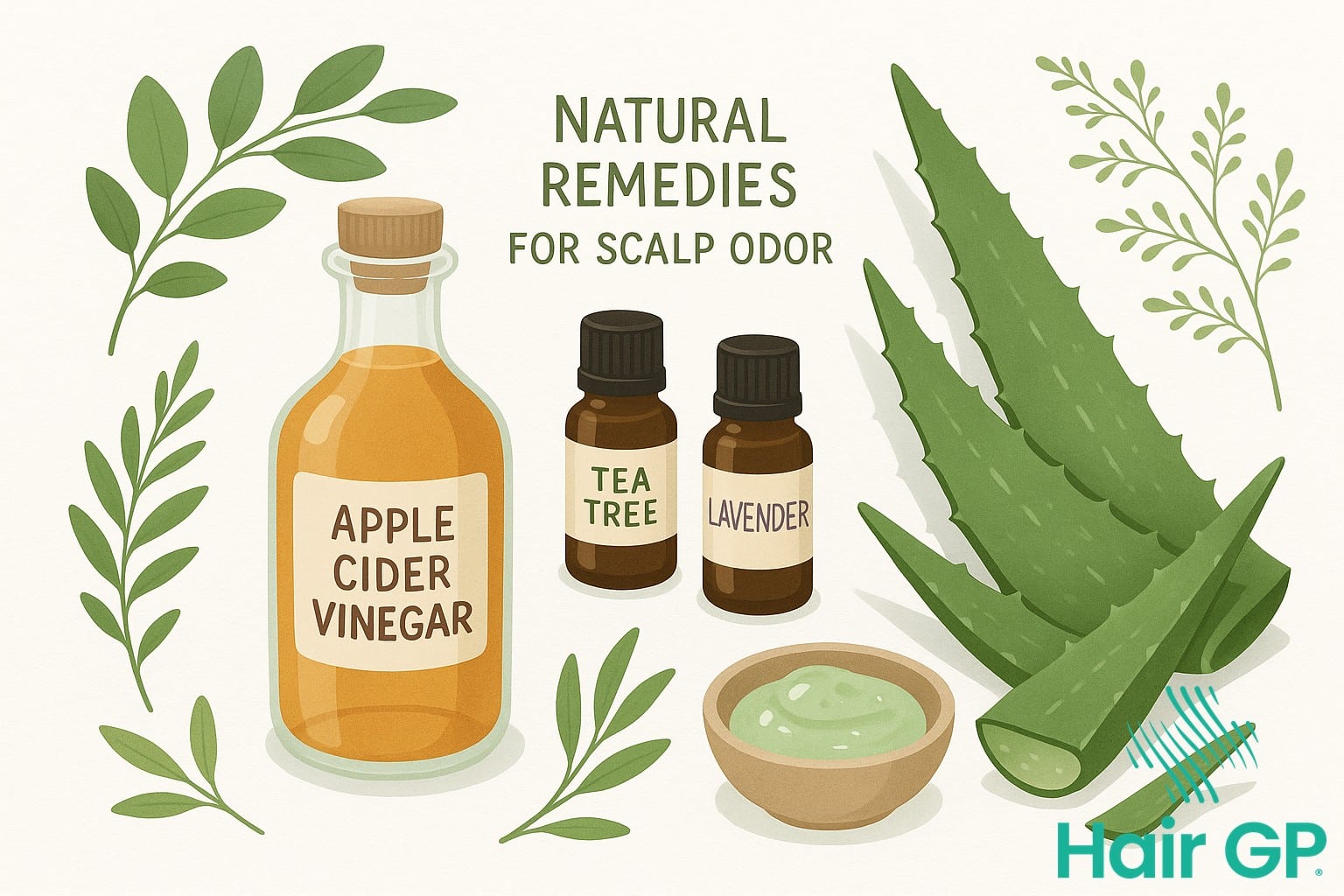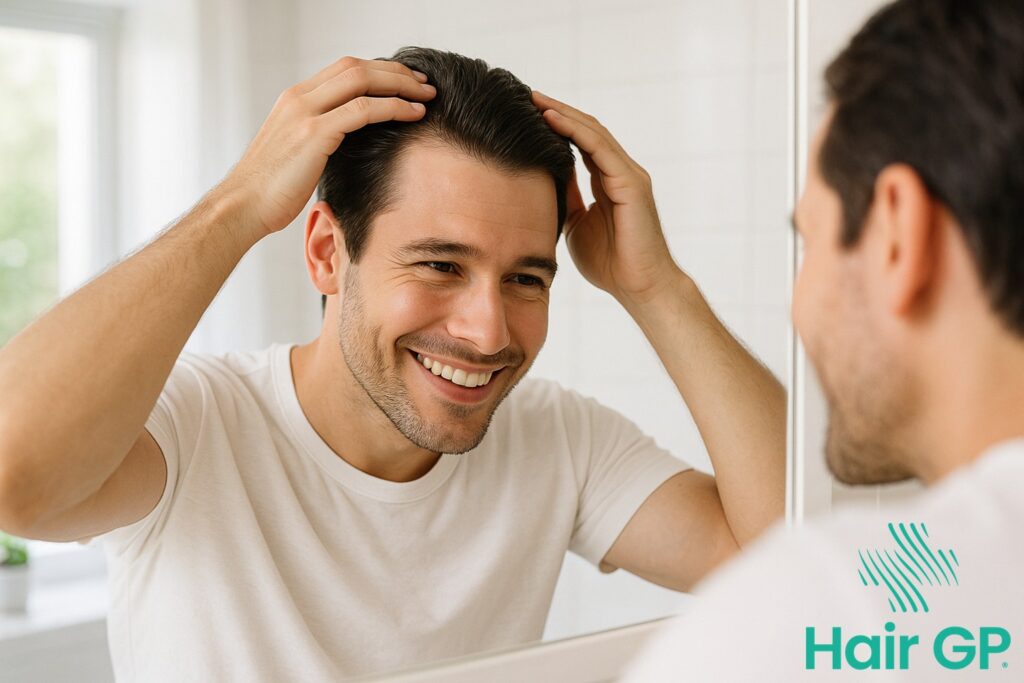Introduction
Discovering your scalp smell persists even after washing hair can be both frustrating and embarrassing. If you’ve ever wondered, “Why does my scalp smell even after washing?”, you’re not alone. This common concern affects countless individuals who maintain regular hygiene routines yet still experience persistent scalp odor.
A smelly scalp can develop from various sources, ranging from everyday factors like excess oil production and bacterial growth to underlying medical conditions that require specific treatment. Understanding the root cause is essential for finding an effective solution.
This comprehensive guide explores the common culprits behind persistent odours, including medical conditions that may contribute to the problem. You’ll learn how to identify different types of scalp smells and what they indicate, discover proven treatments and natural remedies, and gain practical strategies for maintaining long-term scalp health. With the right knowledge and approach, you can effectively address this issue and restore confidence in your hair care routine.
Key Takeaways – TL/DR
- Persistent scalp odor often results from bacterial or fungal overgrowth, not poor hygiene
- Medical conditions like seborrheic dermatitis and scalp psoriasis can cause unpleasant smells
- Natural remedies like apple cider vinegar and tea tree oil can effectively combat scalp odor
- Proper hair care routine and pH-balanced products are essential for prevention
Common Causes of Persistent Scalp Odour
Understanding the common causes of persistent scalp odour helps identify why regular washing may not eliminate the problem. Multiple factors can create conditions where odour-causing bacteria thrive, leading to a scalp that continues to smell bad despite proper hygiene.
Excess Sebum and Oil Production
Overactive sebaceous glands produce excessive amounts of sebum, creating an ideal environment for bacterial growth. This oily substance naturally attracts bacteria and combines with dead skin cells to form a breeding ground for micro-organisms. Hormonal fluctuations, particularly during puberty, pregnancy, or menstruation, can trigger increased sebum production. Additionally, genetic factors play a significant role in determining individual oil production levels, explaining why some people experience persistently oily scalps regardless of washing frequency.
Product Buildup and Residue
Hair products containing silicones, waxes, and heavy oils can accumulate on the scalp over time, trapping bacteria and disrupting the natural scalp microbiome. Improper rinsing techniques often leave residue behind, whilst heavy styling products create layers that regular shampoo cannot penetrate. This buildup prevents proper cleansing and creates pockets where bacteria multiply, leading to persistent odour.
Environmental and Lifestyle Factors
External conditions significantly impact scalp health. High humidity levels promote excessive sweating and bacterial growth, whilst dietary choices affect sebum composition and production. Stress triggers hormonal changes that increase oil production and alter the scalp’s natural balance. Additionally, wearing hats or helmets for extended periods creates warm, moist environments where odour-causing bacteria flourish.

Medical Conditions That Cause Scalp Smell
Several medical conditions can cause persistent scalp odour that regular washing cannot eliminate, often requiring specific medical interventions to address the underlying cause. These conditions range from fungal infections to chronic inflammatory disorders, each producing distinct odour patterns through different mechanisms involving bacterial overgrowth, inflammation, and disrupted skin barrier function.
Fungal Infections and Tinea Capitis
Fungal infections of the scalp, particularly tinea capitis, create persistent odour through fungal overgrowth and secondary bacterial colonisation. Tinea capitis affects approximately 3-8% of the paediatric population globally [1], though adults can also develop this condition. The characteristic musty smell results from metabolic byproducts released by dermatophyte fungi as they break down keratin in hair shafts. Symptoms include patchy hair loss, scaling, and sometimes painful inflammation. The contagious nature of tinea capitis requires prompt medical attention, as it spreads easily through direct contact or contaminated objects. Treatment typically involves oral antifungal medications for several weeks, as topical treatments alone cannot penetrate the hair follicle adequately.
Seborrheic Dermatitis and Dandruff
Seborrheic dermatitis affects up to 11.6% of the general population [2], causing both visible flaking and distinctive scalp odour. This chronic condition involves Malassezia yeast overgrowth, triggering inflammatory responses that disrupt normal skin turnover. The resulting oily, yellowish scales create an ideal environment for odour-producing bacteria. Unlike simple dandruff, seborrheic dermatitis produces more severe inflammation and can extend beyond the scalp. The chronic nature requires ongoing management with medicated shampoos containing antifungal agents or corticosteroids.
Scalp Psoriasis and Autoimmune Factors
Scalp psoriasis creates thick, silvery plaques that trap moisture and debris, leading to secondary infections and associated odour. This autoimmune condition accelerates skin cell turnover, forming raised patches that crack and bleed. The compromised skin barrier allows bacterial colonisation, while the plaques themselves can develop a distinct smell. Some patients also experience smelly hair syndrome, a rare condition producing cheese-like odours. Treatment challenges include balancing aggressive plaque removal with gentle care to prevent further irritation.

How to Identify Your Scalp Odor Type
Identifying your specific scalp odour type is crucial for addressing the underlying cause effectively. An unpleasant smell emanating from your scalp often presents distinct characteristics that provide valuable clues about what’s happening beneath the surface.
A musty, damp smell typically indicates fungal overgrowth or excessive moisture retention, often accompanied by itching or flaking. This particular stink resembles mildew and suggests your scalp’s microbiome may be imbalanced. Sour odours, reminiscent of spoiled milk or vinegar, usually signal bacterial proliferation from trapped sweat and oils.
Chemical or ammonia-like odour issues often stem from product buildup or reactions between hair treatments and natural scalp secretions. Some people describe their unpleasant odour as metallic or medicinal, which can indicate hormonal imbalances affecting sebum production. Understanding these distinctions helps you communicate more effectively with healthcare providers and select appropriate treatments for your specific body odor concerns.
Effective Treatment Options and Home Remedies
Eliminating persistent scalp odour requires a multi-faceted approach combining medical treatments with natural remedies. This comprehensive guide explores proven solutions, from medicated shampoos and clinical-strength products to DIY treatments using ingredients like apple cider vinegar and essential oils, alongside proper washing techniques for lasting results.
Natural Remedies and DIY Treatments
Home-based solutions offer gentle yet effective alternatives for managing scalp odour. Apple cider vinegar rinses help restore scalp pH balance—dilute one part vinegar with three parts water and apply after shampooing. Tea tree oil demonstrates significant antimicrobial properties, with studies showing its effectiveness in reducing dandruff-causing Malassezia yeasts [3]. Mix 5-10 drops with carrier oil for direct application. Baking soda scrubs provide deep cleansing action; create a paste with water and gently massage into the scalp weekly to remove buildup. Aloe vera gel soothes inflammation whilst providing natural antibacterial benefits. Always do a patch test before using on your entire scalp.
Medicated Shampoos and Professional Products
Clinical-strength solutions target persistent odour at its source. Anti dandruff shampoo containing ketoconazole or zinc pyrithione effectively combats fungal overgrowth. Medicated shampoo formulations with salicylic acid help treat dandruff by exfoliating dead skin cells. For severe cases, prescription-strength options containing ciclopirox or selenium sulphide provide intensive treatment. Apply these products as directed, typically leaving on for 3-5 minutes before rinsing thoroughly.
Proper Washing Techniques
Optimising your washing routine maximises treatment effectiveness. Use lukewarm water, as hot temperatures stimulate oil production whilst cold water prevents thorough cleansing. Perform gentle scalp massage for 60 seconds to lift debris and improve circulation. Double-shampooing ensures complete removal of oils and product residue. Focus on thorough rinsing—inadequate rinsing leaves irritating residues that worsen odour. Allow hair to dry completely, as damp conditions promote bacterial growth.

Prevention Strategies for Long-Term Scalp Health
Maintaining proper scalp hygiene forms the foundation of odour prevention. Establishing a consistent hair care routine with the right shampoo makes all the difference—look for pH balanced shampoo options that support your scalp’s natural protective barrier. Choose hair care products suited to your scalp type, avoiding heavy formulations that trap odours. Whilst regular cleansing is essential, over washing strips beneficial oils and disrupts the scalp’s microbiome balance. Aim for washing every 2-3 days, adjusting frequency based on your activity level and oil production. Between washes, manage sweat by rinsing with water after exercise and allowing your scalp to breathe.
Conclusion
Addressing persistent scalp smell requires understanding its underlying causes, from bacterial imbalances to scalp irritation. Whether choosing medical treatments or natural remedies, consistent hair care practices remain essential. By identifying specific triggers and implementing targeted solutions, you can effectively eliminate hair smell and maintain a healthy, fresh-smelling scalp long-term.
Frequently Asked Questions
Yes, excessive use of dry shampoo can contribute to scalp odor by creating product buildup that traps bacteria and oils. Use it sparingly and ensure regular thorough washing.
For persistent scalp odor, washing every 2-3 days with a pH-balanced or medicated shampoo is typically recommended. Overwashing can worsen the problem by triggering excess oil production.
While scalp odor itself doesn’t cause hair loss, underlying conditions like fungal infections or severe seborrheic dermatitis that cause smell can also lead to hair loss if left untreated.
Yes, smelly hair syndrome is a recognized condition where the scalp produces an unpleasant odor despite good hygiene. It’s often related to hormonal imbalances or bacterial overgrowth.
References
- Gupta AK, Mays RR, Versteeg SG, et al. Tinea capitis in children: a systematic review of management. J Eur Acad Dermatol Venereol. 2018;32(12):2264-2274.
- Borda LJ, Wikramanayake TC. Seborrheic Dermatitis and Dandruff: A Comprehensive Review. J Clin Investig Dermatol. 2015;3(2):10.
- Satchell AC, Saurajen A, Bell C, Barnetson RS. Treatment of dandruff with 5% tea tree oil shampoo. J Am Acad Dermatol. 2002;47(6):852-855.









